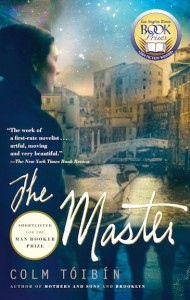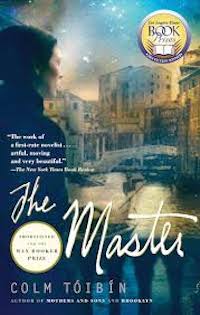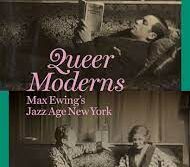 The Master
The Master
by Colm Tóibín
Scribners. 352 pages, $25.
Henry James’s grandfather was a millionaire, as rich as John Jacob Astor. James’s father was a playboy alcoholic who found religion and reformed. Henry grew up in the tony resort town of Newport, Rhode Island, and in the exclusive Beacon Hill section of Boston, with long forays to Europe thrown in. The family associated with Lowells, Emersons, and other Brahmin families. We need to know that to understand that when he relocated to Europe in his late twenties, James very consciously represented in his person whatever intellectual aristocracy the U.S. then possessed.
This is one key to Henry James’s character, and novelist Colm Tóibín has caught it to perfection in his fiction—not novel—The Master, which covers about five years in the great writer’s life. The book opens in 1895 as James’s only produced play, Guy Domville, opens and flops in London. It follows him to his first real home, in Rye, England, next to Europe for the funeral of Constance Fennimore Woolson, and back to Lamb House to receive a visit from his famous brother William, author of The Varieties of Religious Experience, and his family.
In between we get long views of contemporary and past events in Henry James’s life. We find him responding to Oscar Wilde’s mammoth dramatic success with An Ideal Husband and The Importance of Being Earnest followed by his dramatic personal downfall in the mid-1890’s. We flash back to scenes in New England that deal with the wonderfulness and tragic death of his cousin Minnie Temple, who inspired the characters Daisy Miller, Isabel Archer, and Milly Theale in The Wings of the Dove. There’s a long section about the Civil War and the return of the wounded Wilky, his younger brother, excruciating for him and the family. Another segment is about his brilliant, sickly sister Alice, her undiagnosed illness, her wanderings about Europe with companion Elizabeth Loring, and her death. And the suicide of the novelist Woolson, who threw herself from a window in Venice, returns Henry—and the reader—to the author in Italy decades before and the origins of the peculiar relationship between the two writers.
In addition, three of Henry’s homosocial relationships are presented. Briefly, a very early one, set in North Cranford, London, tells of a single night when Henry shared a narrow bed with his young friend Oliver Wendell Homes—yes, that Oliver Wendell Holmes! A second unfulfilled encounter was with Paul Jurowsky, with Henry supposedly remaining glued to the spot across the street from the artist’s flat all night long in Paris. Third, and in more detail, comes the later, more complex relationship that the author had as a man of 55 with the young American sculptor Henrik Andersen, whom he had met in Rome and spent time with in Rye. All three are, in Tóibín’s view, unfulfilled, supporting the view of James’s biographer Leon Edel and others who believe he may have been homosexual but never did anything about it. There’s also a fourth unfulfilled encounter posited by Tóibín, based on what I’m not sure, but nicely done, with a man named Hammond, an Irish servant to the satirically funny Lady Wolsely.
For a reader who knows anything about James’s life, these are pretty much the private high points of his otherwise unextraordinary life (never married, no children). Tóibín, author of the award-winning novel The Story of the Night (1998) and the more recent UK bestseller Blackwater Lightship (2000), works up these incidents as well as, indeed better than, can be expected, writing them in a language that, while not quite Jamesian, contains allusions to James’s work and has resonances of his style. Even if you’ve never read James or did so years ago and forget what you read, The Master is eminently approachable, an altogether wonderful experience. It could cross over to a mainstream audience as a historical, even romantic, work of fiction.
Now the caveats. I wrote that it was a fiction, not a novel, by which I meant that, like Edmund White’s luscious Fanny (2003) or Mark Haddon’s brilliant, moving Curious Incident of the Dog in the Nighttime (2002), The Master is all voice, all single narrative, an impersonation, the equivalent of a one-character play like Tru or Mark Twain Tonight. James comes across in a series of layers, each a refinement over the last: we glimpse his tact, his gentility, his priggishness at times, his sly humor at other times, his inability to escape childhood resentments, and his fears that he may have been responsible for the deaths of Minnie Temple and Constance Woolson—all marvelously done.
But the other characters in the narrative barely exist. Minnie Temple, Constance Woolson, and Alice James suffer the most. In Blackwater Lightship, Tóibín showed that he can write women. James’s women should have leapt off the page, as they do in his own books. Here they barely come to life. Only Lady Wolsely is fun, while his sister-in-law sputters to life only at times. William James and Henrik fare only slightly better. Unless Tóibín is purposely doing this to suggest that James understood no one in his life—which I’ll never believe, having read his letters—these characters simply don’t work.
There are compensations. Sequences like Wilky’s return from war; the story of James’s servants, the Smiths, as they decline into alcoholism; James and Woolson’s Italian servant giving her clothing a water burial in a Venetian lagoon—these scenes are brilliant. The final section, in which the middle-aged brothers wage a genteel guerrilla war, is terrific.
Then there’s the problem of James’s sexuality. James never has homosexual or apparently any other kind of sex: undoubtedly this is the safest way to go from Tóibín’s standpoint. Still, I suspect Tóibín has also read 19th-century letters and diaries collected by Jonathan Katz, Martin Duberman, and other scholars, in which eminent Americans write of shared beds in their youth and how they held, kissed, and “poked” each other all night long. Far less of the line-drawing and homophobia of our time existed then, and far more innocence. Infatuations between boys and men were common and favorably remarked upon by peers, parents, and teachers. Even Abraham Lincoln is now thought to have had same-sex episodes in his youth (and later too!). This reader could have easily accepted James’s awkward, fumbled attempts at sex with Holmes or Jurowsky rather than settle for the yearning nonfulfillment posited here. Tóibín evidently decided that it was just too messy.
A potentially larger problem concerns the period Tóibín has chosen to cover. The failure of Guy Domville is a great place to begin, but for a reason other than the one Tóibín cites. That disaster, coming so close after James had seen his large transatlantic audience begin to dry up in the 1890’s, seems to have burst open some unexpected creative fount in James. In the four years after the play bombed, James wrote—along with his usual large output—five of the strangest works of his or anyone’s career, and all but one of them dealt with isolated, abandoned, threatened children. In What Maisie Knew, the little girl is a shuttlecock in a bitter high-society divorce. In The Awkward Age, a teenage girl in a telegraph office grows up much too fast as she learns terrible adult passions. In The Other House, a child is murdered, probably by her nanny. In The Turn of the Screw, who knows exactly what happens? But by the end little Flora is a complete hysteric and little Miles is dead. The fifth, a novella, The Altar of the Dead (Truffaut filmed it as The Green Room), is about a man and woman who meet at a memorial chapel, then slowly and uncannily form a relationship based entirely on their competing to outdo each other in how enormous, multifold, and tragic each of their lives has been.
It’s difficult not to see these five works as having been ripped out of James’s psyche by his sense of utter failure at the very moment he expected to relax into a comfortable authorial fame. Those menaced children must in some sense be James himself. That these themes dominated James’s conscious and unconscious mind during this period is seen in the fact that once they were written, he would suddenly relax, having seemingly given up something that had been tormenting him. He would then go on to pen the far more serene masterpieces, The Ambassadors, The Wings of the Dove, and The Golden Bowl. Why Tóibín didn’t address these five works is not entirely clear. In my view, this is the real story of James’s life between 1895 and 1899. Impressive as is Tóibín’s achievement in The Master, I believe there’s another, deeper, more extraordinary story yet to be told.
Felice Picano’s novel Dryland’s End is being republished this year. He is the co-author of the new edition of The Joy of Gay Sex, recently published by HarperResource.





